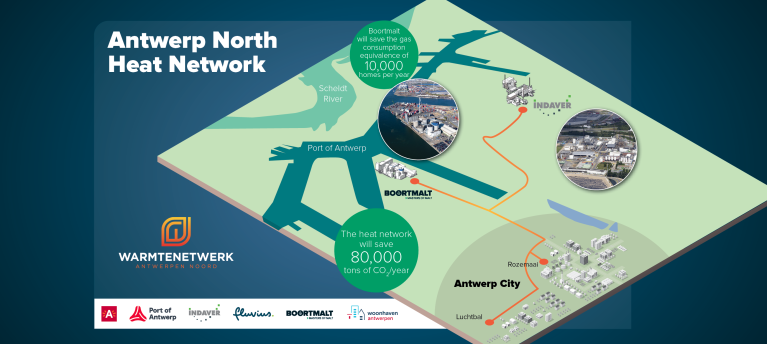
Sustainability
Antwerp North Heat Network

Today, we are pleased to share this very ambitious carbon reduction project at our Antwerp maltings. We believe in joining forces with partners to achieve our sustainability goals. The Antwerp North heating network is an example of putting that commitment into action.
By signing the agreement for the supply of carbon-neutral heat, we are considerably reducing our consumption of fossil fuels while enabling homes in the city of Antwerp to be connected to the network.
This heating network can cover 60% of the site's heat requirements and eliminate the equivalent gas consumption of 10,000 households every year.
Heat network to reduce CO2-emissions in Antwerp by 80.000 tons per year
The Antwerp North Heat Network underwent a long preparation phase before a final investment decision was made. The benefits for people and society are huge. When fully constructed, this heat network will be capable of delivering an annual CO2 saving of 80,000 tonnes. That is as much CO2 as 25,000 Antwerp households emit in a year. When Boortmalt and Woonhaven are connected, the heat network will immediately achieve an initial reduction of 35,000 tonnes of CO2 per year. In the future, no less than three thousand households, 7 schools and several public buildings will receive their heat from a heat network fed by residual heat from industry. To make heat networks possible, contracts with industrial customers are a particular asset. Large players ensure that plenty of useful heat is also purchased outside the 'heating season', which makes for better use of the heat network. Investment support from the Flemish government also makes it possible to build this network. The ultimate goal is that the residential end user will not pay more for his sustainable heat than he does now for his fossil fuel.
Industry balances heat supply and demand
Indaver's processing operations in Antwerp North generate a lot of heat. This is already being used for its own business processes and for electricity production. The residual heat that remains after electricity production is still suitable for heating purposes. The neighbouring company 'Amoras', the mechanical dewatering project of the port of Antwerp, already heats its buildings today with residual heat from Indaver. Boortmalt, the world’s largest malting company, has its most important malting plant at some 8 km from Indaver. ith a production capacity of 470,000 tonnes per year, enough malt is produced here to brew around 16 billion beers a year. Large quantities of heat are required during the malting process. Boortmalt currently uses cogeneration units and gas burners to produce this process heat. When Boortmalt taps heat directly from the heat network in the future, the company will save an amount of natural gas comparable to the annual consumption of approximately 10,000 families.
An open-access network & two transport companies
The heat network in the port will consist of two major parts. For each section, a company will be responsible for construction, operation and maintenance. The first part of the route, the heat supply to the company Boortmalt, will be built and operated by transport company 'Warmtenetwerk Antwerpen Noord'. Partners in this transport company are Indaver and Port of Antwerp. The second part, the residential heat supply, is being realised by Fluvius on behalf of the City of Antwerp and can count on major customers such as social housing company Woonhaven, which will connect its buildings with some 3,200 homes in the Luchtbal and Rozemaai districts to the system.
A special feature of this network is that it will be an 'open access' network: it will be open to additional suppliers and/or customers of heat who wish to join at a later stage. This is the first open access network to be realised in Belgium.